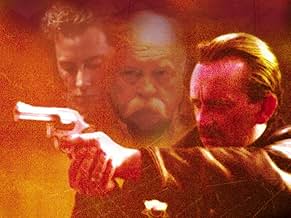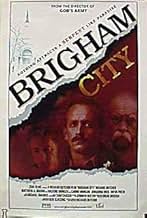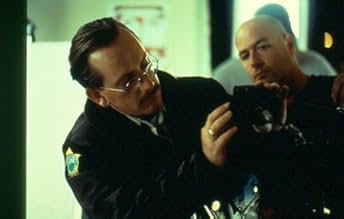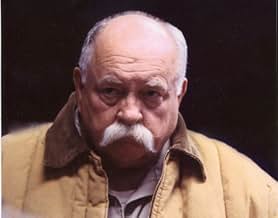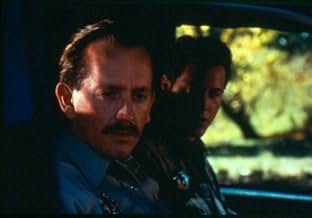CALIFICACIÓN DE IMDb
6.6/10
1.7 k
TU CALIFICACIÓN
The sheriff of a small Utah community searches for a serial killer.The sheriff of a small Utah community searches for a serial killer.The sheriff of a small Utah community searches for a serial killer.
- Dirección
- Guionista
- Elenco
- Premios
- 3 premios ganados en total
Wendy Hoop
- April
- (as Wendy Gardiner)
- Dirección
- Guionista
- Todo el elenco y el equipo
- Producción, taquilla y más en IMDbPro
Opiniones destacadas
I thoroughly enjoyed this one. I watched it knowing it wasn't going to be a light-hearted film, which was an advantage over many people I know who went to it thinking it was a happy ending sort of show. I must admit it was a little odd to see the goings-on of LDS church meetings and other LDS cultural aspects on the big screen, but it is territory that needs to be covered so that future movies that cover similar territory won't be weighed down with reviews about the LDS church rather than focusing on the movie at hand. I watched the DVD a second time with Richard Dutcher's audio commentary and, after that, I concluded that he is someone who is conscientious about finding the balance in film in regards to the religious issues dealt with, not too pro or too anti. I was quite amazed as to how resourceful he was, considering their meager budget he had to work with. The outcome was superb and he told the story in a simple, yet elegant way. I look forward to Mr. Dutcher's next film.
It's difficult to watch Richard Dutcher's very capable and entertaining, `Brigham City,' without choking on the intended Mormon zeitgeist that permeates the story. Dutcher goes to considerable length to successfully portray Mormons as loving, decent, church-going friends and neighbors as justification for suspending constitutional rights and imposing a theocracy.
Dutcher plays Wes Clayton, Sheriff of a fictional small town in Utah called Brigham City. Clayton is also the `Bishop' for Mormons in that area, which makes him unquestionably the most influential man in town. A widower who lost his wife and only son in a traffic accident years ago, Clayton is permanently saddened by the loss. Dutcher portrays him with a kindly stoicism, a righteous man who takes both his sacred and secular responsibilities seriously.
When a young woman from California is found murdered in an old barn on the outskirts of town, Clayton calls in the FBI and washes his hands of the investigation, telling his enthusiastic young deputy that this has nothing to do with Brigham City, that it was a random act that could have happened on any number of freeway off ramps. It's something Clayton desperately wants to believe; that Brigham City is a paradise of the faithful and as a result enjoys a divine immunity from the evil `out there' in the world. His duty as both Sheriff and Bishop is to keep it that way. Unfortunately, a second body is discovered, and Clayton is forced to realize that his `Eden' has been invaded by the outside world, and his duty now requires him to get involved.
His ensuing investigation makes your skin crawl. Clayton's methodology is autocratic and fascist. His first suspicion is that the murderer must be an outsider or a `Jack Mormon;' consequently, he and his deputies hang out at the only bar in town, collecting beer bottles and glasses to dust for fingerprints, hoping for a match from the FBI database. When the town's convenience store clerk disappears, Clayton ratchets up the police state, using his authority as Bishop to order church members to go out two by two, as in their missionary days, and search every house in town, lack of a search warrant notwithstanding. When one of them objects by saying he has to be at work, Clayton responds that nothing is more important than the life of the missing girl. When one of the town members rightfully refuses to allow a search of her house, he forces his way in.
Despite deep faith, good intentions, and concern for another human life, fascism in the name of Jesus is still fascism. Clayton's heavy-handedness is precisely why the Bill of Rights exists. While `Brigham City' is a good movie in terms of characterization and story, it is also a very frightening parable about the dangers of religion, and remarkably parallels our nation's attitude and course of action in the aftermath of September 11th. Essentially, `Brigham City' is a microcosm of what the christian right ultimately envisions as America's future, and it's no place where I'd want to live.
Dutcher plays Wes Clayton, Sheriff of a fictional small town in Utah called Brigham City. Clayton is also the `Bishop' for Mormons in that area, which makes him unquestionably the most influential man in town. A widower who lost his wife and only son in a traffic accident years ago, Clayton is permanently saddened by the loss. Dutcher portrays him with a kindly stoicism, a righteous man who takes both his sacred and secular responsibilities seriously.
When a young woman from California is found murdered in an old barn on the outskirts of town, Clayton calls in the FBI and washes his hands of the investigation, telling his enthusiastic young deputy that this has nothing to do with Brigham City, that it was a random act that could have happened on any number of freeway off ramps. It's something Clayton desperately wants to believe; that Brigham City is a paradise of the faithful and as a result enjoys a divine immunity from the evil `out there' in the world. His duty as both Sheriff and Bishop is to keep it that way. Unfortunately, a second body is discovered, and Clayton is forced to realize that his `Eden' has been invaded by the outside world, and his duty now requires him to get involved.
His ensuing investigation makes your skin crawl. Clayton's methodology is autocratic and fascist. His first suspicion is that the murderer must be an outsider or a `Jack Mormon;' consequently, he and his deputies hang out at the only bar in town, collecting beer bottles and glasses to dust for fingerprints, hoping for a match from the FBI database. When the town's convenience store clerk disappears, Clayton ratchets up the police state, using his authority as Bishop to order church members to go out two by two, as in their missionary days, and search every house in town, lack of a search warrant notwithstanding. When one of them objects by saying he has to be at work, Clayton responds that nothing is more important than the life of the missing girl. When one of the town members rightfully refuses to allow a search of her house, he forces his way in.
Despite deep faith, good intentions, and concern for another human life, fascism in the name of Jesus is still fascism. Clayton's heavy-handedness is precisely why the Bill of Rights exists. While `Brigham City' is a good movie in terms of characterization and story, it is also a very frightening parable about the dangers of religion, and remarkably parallels our nation's attitude and course of action in the aftermath of September 11th. Essentially, `Brigham City' is a microcosm of what the christian right ultimately envisions as America's future, and it's no place where I'd want to live.
It would seem that Brigham City has been largely rejected by its target audience -- the Mormons. This surprised me, as I found myself turning its themes over in my mind for a full week after first seeing it.
Granted, it is nothing if not disturbing -- especially to the Mormon subculture which has been so different from mainstream America for so long that it has come to pride itself on its separateness. Yet I found myself deeply moved by the film. It examines with agonizing realism (and sensitivity) a core fear of those with deep religious beliefs: Will my hope survive when God says no to my prayers and allows the world to come flooding in? Am I only in this for the perks, the protection? Will my faith survive pain that seems completely devoid of meaning?
Yet Brigham City's scope is not confined just to the Mormons or just to the religious -- its broader question is whether it is possible to be truly wise while remaining idealistic and innocent. Because of this, the movie seems especially timely and poignant -- both to an increasingly cynical America haunted by its beautiful-but-elusive potential and to a Mormon culture peering warily out at the rapidly growing, international church with its attendant array of alien dangers and trials.
What effect does encroaching despair and disillusionment have on each individual American, Mormon, idealist of any stripe? How much of your innocence and optimism will you have to part with, even in a victory? It's troubling, and no concrete answers are offered, as this is a question that each believer must ultimately answer for himself. I love this movie's balance of honesty and sensitivity, and I hope that Richard Dutcher will not be discouraged by the less-than-warm reception the LDS audiences have given it. We need more movies like this -- and by "we," I mean everyone.
Granted, it is nothing if not disturbing -- especially to the Mormon subculture which has been so different from mainstream America for so long that it has come to pride itself on its separateness. Yet I found myself deeply moved by the film. It examines with agonizing realism (and sensitivity) a core fear of those with deep religious beliefs: Will my hope survive when God says no to my prayers and allows the world to come flooding in? Am I only in this for the perks, the protection? Will my faith survive pain that seems completely devoid of meaning?
Yet Brigham City's scope is not confined just to the Mormons or just to the religious -- its broader question is whether it is possible to be truly wise while remaining idealistic and innocent. Because of this, the movie seems especially timely and poignant -- both to an increasingly cynical America haunted by its beautiful-but-elusive potential and to a Mormon culture peering warily out at the rapidly growing, international church with its attendant array of alien dangers and trials.
What effect does encroaching despair and disillusionment have on each individual American, Mormon, idealist of any stripe? How much of your innocence and optimism will you have to part with, even in a victory? It's troubling, and no concrete answers are offered, as this is a question that each believer must ultimately answer for himself. I love this movie's balance of honesty and sensitivity, and I hope that Richard Dutcher will not be discouraged by the less-than-warm reception the LDS audiences have given it. We need more movies like this -- and by "we," I mean everyone.
Several days after seeing this movie, I'm still thinking about it. That's about the highest compliment I can pay to a film.
As in all great films, the power of _Brigham City_ lies beneath the surface. The whodunit plot is merely a prop for the exploration of issues that affect us all, especially those of us who claim some sort of religious faith. The age-old question of whether innocence and wisdom can coexist is asked, never answered, and in the end eclipsed by a more pertinent question: If redemption is available for those who have lost their innocence, is it also available for those who fail through lack of wisdom?
As in all great films, the power of _Brigham City_ lies beneath the surface. The whodunit plot is merely a prop for the exploration of issues that affect us all, especially those of us who claim some sort of religious faith. The age-old question of whether innocence and wisdom can coexist is asked, never answered, and in the end eclipsed by a more pertinent question: If redemption is available for those who have lost their innocence, is it also available for those who fail through lack of wisdom?
7=G=
Sleepy little Utah town and Mormon enclave Brigham City questions its faith as it loses its innocence to a serial killer. An excellent mutlilayered one-man-band indie, "Brigham City" works well as a whodunit, even better as a human drama, and still better as a provocative examination of issues of faith in the presence of evil. A tad obvious, somewhat sanitized, and not without its plotholes, "BC" should be an entertaining and worthwhile watch for most mature adults into serious-minded drama irrespective of faith. (B)
¿Sabías que…?
- TriviaNone of the actors or crew knew whom the real murderer was prior to the last scene being filmed. The actors and crew filming the scene had to sign a contract saying they would not reveal which one of them played the murderer, until after the movie was officially released.
- ErroresAfter Wes deputizes Stu and gives him a badge, Stu doesn't wear it for the rest of the movie.
- Bandas sonorasBanjo Boy
Written by Ryan Shupe
Performed by Ryan Shupe & the Rubberband
Copyright ©1999 Ryan Shupe (BMI)
Courtesy of Tydal Wave Records
Selecciones populares
Inicia sesión para calificar y agrega a la lista de videos para obtener recomendaciones personalizadas
- How long is Brigham City?Con tecnología de Alexa
Detalles
Taquilla
- Presupuesto
- USD 1,000,000 (estimado)
- Total en EE. UU. y Canadá
- USD 852,206
- Fin de semana de estreno en EE. UU. y Canadá
- USD 103,629
- 8 abr 2001
- Total a nivel mundial
- USD 852,206
- Tiempo de ejecución
- 1h 59min(119 min)
- Color
- Mezcla de sonido
- Relación de aspecto
- 1.85 : 1
Contribuir a esta página
Sugiere una edición o agrega el contenido que falta


